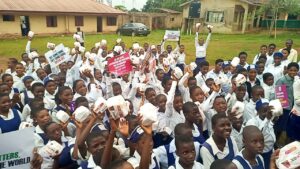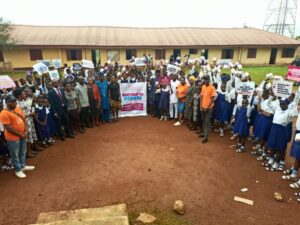By Olajumoke Omisore


On May 28, 2024,FELAD commemorated the World Menstrual Hygiene Day with an outreach program conducted at Ilupeju High Schoo,Oye local government with the aim of sensitizing the female students on menstrual hygiene and health management. The event was organized by Foundation for Excellent Living and Development in collaboration with target girls from age 12-17.The initiative also included the distribution of 1,000 sanitary pads to promote proper menstrual hygiene practices and training on Reusable pads for sustainability.
Objectives
The primary objectives of the outreach program were:
To educate the girls on menstrual hygiene and health management.
To break the stigma and taboos surrounding menstruation.
To distribute sanitary pads to ensure that the girls have access to proper menstrual hygiene products.
To train them on reusable pads.
Activities Conducted
Menstrual Hygiene talk
Speaker Presentations: Olajumoke Omisore delivered comprehensive presentations on the biological aspects of menstruation, the importance of maintaining hygiene during periods, and managing menstrual health issues and debunking Myths and Misconceptions.
Interactive Discussions: Students participated in interactive Q&A sessions where they could ask questions and share their experiences in a supportive environment.
Demonstrations: Practical demonstrations on the correct use of sanitary pads, including disposal methods, were provided.
Distribution of Sanitary Pads:
Each student received a packet of sanitary pads and Pantyliners along with a brochure detailing menstrual hygiene practices donated to the school.
Information on local resources and support systems for menstrual health was also distributed.
Inauguration of GEMS CLUB.:
GEMS CLUB was inaugurated to mentor the students both boys and girls on Life skills and Sustainable Development Goals focused on building confidence and promoting peer support networks among the students.
Impact and Feedback
The outreach program had a significant positive impact on the students, as evidenced by the following:
Increased Awareness: Post-event surveys indicated a marked increase in knowledge about menstrual health and hygiene among the participants.
Empowerment: Many students reported and demonstrated feeling more confident and less embarrassed about discussing menstruation.
Positive Feedback: Teachers and students provided positive feedback, appreciating the practical advice and the free distribution of sanitary pads.
Challenges and Recommendations
Challenges:
Cultural Sensitivities: Addressing deeply rooted cultural taboos around menstruation required sensitive handling this caused an uproar
Resource Limitations: Ensuring an adequate supply of sanitary pads for all participants was a logistical challenge.
Recommendations:
Continued Education: Regular follow-up sessions and continuous education programs should be implemented to reinforce the information provided.
Community Engagement: Involving parents and the broader community in awareness programs can help sustain the impact and break cultural barriers.
Sustainable Supplies: Establishing partnerships with local businesses and NGOs to ensure a continuous supply of menstrual hygiene products.
A pad Bank can be set up in the schools.
Lastly,We plead with the government to help subsidize and regulate Sanitary pads in the market and make it affordable like it is for condoms. Sex is by choice, Menstruation is statutory..
Conclusion
The secondary school outreach program on menstrual hygiene and health management at Ilupeju High School was a resounding success. By educating the students and providing them with the necessary resources, the initiative not only enhanced their knowledge but also contributed to their overall well-being and confidence. Future programs should build on this foundation to create a more inclusive and supportive environment for boys and girls’ health and education.
Prepared by:
Olajumoke Omisore
Executive Director,
Foundation for Excellent Living and Development (FELAD)
08138738393